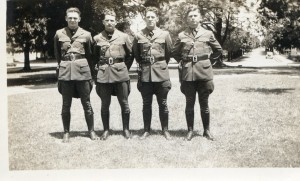 The stories I heard Trooper friends of my father tell were always accompanied by laughter. There were civilians present – kids, wives, outsiders they trusted. They kept the darker ones to themselves.
The stories I heard Trooper friends of my father tell were always accompanied by laughter. There were civilians present – kids, wives, outsiders they trusted. They kept the darker ones to themselves.
I remember sitting at the top of the stairs once when I was 11 or 12 and listening to a half dozen of my father’s friends drinking beer and and whiskey and telling cop stories and laughing so hard that some of them spit up their Schlitz. I don’t remember any accounts from that night, but I remember thinking about how much fun they had when they all gathered together.
Graduation Day at the Myerstown Training Site, July, 1938; my father is second from the left. As so often happens in these photos, I do not know the names of the other Troopers.
My father knew how to tell a story. He had the Irish in him. His sense of timing never left him — he knew when to pause, when to bring in the climax, the moment to add the telling detail that made the whole narrative come to life, breathing right there in front of you. Sometimes the memory was so clear and close to him that he laughed in the middle of the telling, still so happy and amazed that he had been a part of such a time. He passed this on to us. My brother especially is a very good story teller.
These are the stories he told:
The Titus Inn, a big pile of a roadside bar, sits on a nasty curve of Route 100 midway between 100’s intersections with Route’s 23 and 401. In 1938 or ’39 it was another taproom dive and lots of drunk driving accidents had their beginning there. My father, 24, thought he could stop them.
He was assigned to Elverson early in his career; it might have been his first posting. Eager to show that he had initiative and that he could solve a problem, he convinced another Trooper, a rookie like himself, to join him in some crime-stopping.
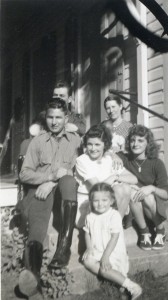 There had been heavy snowfall that winter. It was very cold the night they tried out their tactic. They were both on patrol; each one had a ‘ghost car’. They found choke points and they blocked Route 100, north and south. They set out flares. Any vehicle trying to pass had to stop. They walked to the driver’s side. The driver rolled down his or her window. Bending close to the driver, they sniffed for alcohol fumes. If they smelled booze, they each reached into the car, took the keys out of the ignition and tossed them into the snow alongside the road. “Find ‘em” they said. The drivers were much closer to sober by the time they had sloshed around in the snow and found their keys. Both of them were in trouble with their Sergeant the next day, but for a period of time, the number of accidents on Route 100 involving drinking went down.
There had been heavy snowfall that winter. It was very cold the night they tried out their tactic. They were both on patrol; each one had a ‘ghost car’. They found choke points and they blocked Route 100, north and south. They set out flares. Any vehicle trying to pass had to stop. They walked to the driver’s side. The driver rolled down his or her window. Bending close to the driver, they sniffed for alcohol fumes. If they smelled booze, they each reached into the car, took the keys out of the ignition and tossed them into the snow alongside the road. “Find ‘em” they said. The drivers were much closer to sober by the time they had sloshed around in the snow and found their keys. Both of them were in trouble with their Sergeant the next day, but for a period of time, the number of accidents on Route 100 involving drinking went down.
Dad sitting on the porch of the sub-station at Elverson. I don’t know the name of the family or the Trooper sitting in back of him.
The cold was a problem. My father remembered the early patrol cars did not have heaters. In addition, before being issued winter caps with fur linings and ear flaps, they were under orders to wear their regulation campaign hats at all times outside their vehicles. In winter at accident scenes, they could stand for hours in the deep cold and wind. Someone started wrapping a silk babushka around his head and ears and then putting the campaign hat on top. That seemed like a good idea. Pretty soon all of them were doing so. They did their best not to be caught by a superior while wearing one.
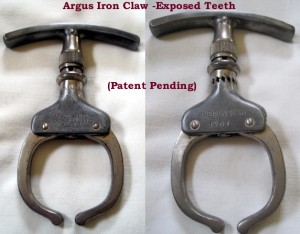 Before they were issued handcuffs, they had the Claw*, a device my father liked very much. He said that once you put that on a guy and applied a little pressure, he would meekly follow you anywhere you wanted him to go.
Before they were issued handcuffs, they had the Claw*, a device my father liked very much. He said that once you put that on a guy and applied a little pressure, he would meekly follow you anywhere you wanted him to go.
At the Elverson sub-station barracks one of his friends, whom he had nicknamed “Two Gun McGurk,” became so infuriated by the early morning calls of dozens of crows roosting in the trees behind the station that one time he grabbed a shotgun, threw the window open all the way and began blasting. There were complaints. The Constable paid them a visit and pleaded with them not to do it again.
The house that had been the Elverson sub-station is now a family home. A solid looking, old three bay garage sits at the end of narrow driveway in the back. He patrolled all the back roads I walk and drive now, including a valley where what was at the time the richest family in Pennsylvania had their second residence, a 3000 acre working farm. Governor Earle once paid a visit to the owner. My father was assigned to be the Governor’s bodyguard and driver. He was ordered to make sure that nothing happened to the Governor. There may have been a second Trooper with him.
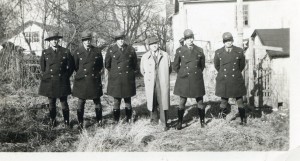 The sub-station roster at Elverson. My father is second from the left.
The sub-station roster at Elverson. My father is second from the left.
The staff knew all the Troopers from Elverson and someone brought him a sandwich. Following within earshot of the Governor and his host, he saw an argument break out between them. He heard the politically powerful and immensely wealthy host angrily point a finger at the Governor and say “I paid for you. You’ll do what I tell you to do.” He told that story without comment. He never followed up with what he thought. He just shook his head.
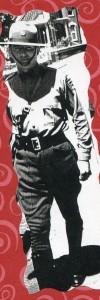 At another large farm the owners would leave sandwiches in the bird houses for them, and when they would stop at the main house they were welcomed with smiles and lemonade.
At another large farm the owners would leave sandwiches in the bird houses for them, and when they would stop at the main house they were welcomed with smiles and lemonade.
Making an arrest in Pottstown.
Depression boy that he would forever remain, he was a terrific scrounge. One time on patrol he came upon men tearing apart a railway boxcar made of 3/4″ planks. He asked what they were going to do with them. “Burn them”, they said. He must have borrowed a truck somewhere.He brought a dozen of those planks back to our home and built a heavy picnic table.
He knew the athletic trainer at Reading High and asked him to save comic books the high school kids had left in the locker room. I can still see him walking from the barn garage down the walk to the back door of our Myerstown home in his uniform, packages of comic books tied together in twine dangling from both hands. Wonderful.
Before two-way radios they relied upon a signal system that consisted of flags, similar to mailbox flags, which were nailed somewhere on gas station or store fronts. They passed these points on their regular patrol routes. If the flag were in the up position, it meant that something had happened and their sergeant had called the owner and asked him to raise the flag. They then called the sub-station from that business and received their orders.
One time he was helping at a terrible crash of a chicken truck on some major highway. Chicken parts, screaming chickens, chicken shit and blood and feathers seemed everywhere he stepped. He did not eat chicken for years after that accident.
My brother remembers phone calls coming to our home in Myerstown when my father was at the dinner table, off duty. He spoke for a minute or so and then told my mother that he had to go out to work. He left in civilian clothes. Years later he later told my brother that he had served as the front man a few times for raids on gambling houses and brothels in Reading during its wild era in the late 50’s and early 60’s.
While sub-station commander at Hamburg in the late 60’s, early 70’s, he had his men try a new way to catch speeding truckers on Route 78. He had them string orange Christmas tree lights on the upper part of their patrol car windshields. When truckers looked back, they saw what looked like the lights of another truck. When they speeded up, they got pinched.
His friend, Donald Holloway, a Trooper who served under him when he was at Hamburg told this story to my brother-in-law. My father laughed when he was told of it and said that it was accurate. I find it curious that he never told us this one and indicative of his standard for deciding which stories to tell us: a belligerent, drunk soldier had been arrested. He was in uniform but he had no ID on him. He was cursing everyone, every Trooper. He would not give up his name and he was causing a ruckus. Trooper Holloway brought him to my father at his desk. He started in on my father, cursing him out. My father stood up, picked up a fly swatter, and swatted the soldier across the face twice. The soldier immediately shot to attention and delivered his name, rank and serial number. The other Troopers present were laughing so hard that it was all my father could do to keep a straight face.
He knew where the Amish boys hid their cars in the woods; they parked their buggies next to the cars, changed into “Yankee” clothing and took off for a night of carousing.
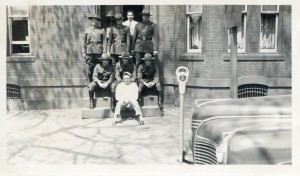 Part of the Lebanon sub-station roster. My father is not in this photo. Maybe someone will recognize some of these Troopers.
Part of the Lebanon sub-station roster. My father is not in this photo. Maybe someone will recognize some of these Troopers.
Patrolling somewhere deep in farm country in Lebanon County in October, coming on to nightfall, he saw a car pulled off to the side of the road and kids hustling back and forth from the field to another kid just outside the car. He saw them before they saw him. He cut his lights and engine and glided up but stayed far enough away so that they still were not aware of his presence. They were taking corn from the field, shucking it and filling bags, all in preparation for Mischief Night.
He got out of his car, careful not to close the door. He left his hat behind. He walked quietly up to the boy by the side of the car with the bag. When the boy raised his eyes and saw him, my father put his finger to his lips and whispered “Shhhh.” A boy from the field returned, eyes on the corn he was carrying. My father cupped his hands and the boy dumped the corn into his hands, noticed their size and shape, and looked up, his eyes growing enormous. The boy behind him started to run. My father said in a disappointed voice, “Don’t run.” They didn’t.
*The Argus Claw was patented in 1931